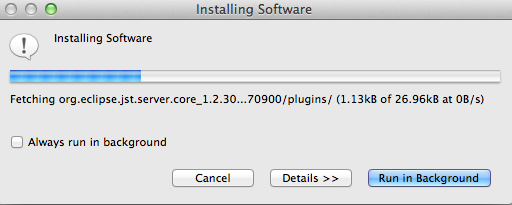TLDR: It worked and I was able to run an Eclipse Plugin, make big changes in a class already loaded (like adding a new field/method), and have access to those changes without needing to restart Eclipse.
Part 1: Installing JRebel
First step was to install JRebel from the Eclipse Marketplace:
... which took a little bit to install since there were a number of large downloads:
To activate it, I copied and paste the license string (without the pre and post comments) into the provided TextBox , and we get a little visual clue (top left icon goes green) that the license is good:
Part 2: Configure JRebel
To add JRebel to the Plugin project, there were two things to do:
1) add the JRebel Nature:
2) enable JRebel in the desired Run Configuration:
Note: there was this message which can be ignored (for now) since I'm not going to use an Java Project or server in this test/PoC
Part 3: Using JRebel to add new fields and methods
With JRebel enabled in the spawned Eclipse instance (the one that loads the TeamMentor Plugin from class files and not a jar), I opened the Write TeamMentor Script UI and wrote a simple groovy script that showed the contents of a static String from the tm.utils.Consts_Eclipse class.
In the screenshot below, the top part (with the java code files) belongs to the host eclipse instance, and the bottom part is the TeamMentor Groovy based Script editor running on the spawned Eclipse instance.
The script above showed how we can write a groovy script that gets the a static value from a class, and the script below shows how to get a list of fields from that class (which at the moment is 3)
And that is exactly what you can see in the screenshot below :)
Note how there is a new static String field on the top editor (called TEST_NEW), which is then listed by the groovy script below:
A quick glance at the Console view, will also show JRebel in action:
We can use the same technique to have access to its value:
Here is what happens if we try to access a field that doesn't (yet) exist:
And here is what happens when that 'non existent' field is added:
Note how in the example below, two new methods are added to the Consts_Eclipse class, which are then used (without Eclipse restart) by the groovy script running on the spawned Eclipse instance:
This is REALLY powerful, since I can now work on the Eclipse core APIs (consumed by the TeamMentor plug-in) without needing to restart Eclipse.



















